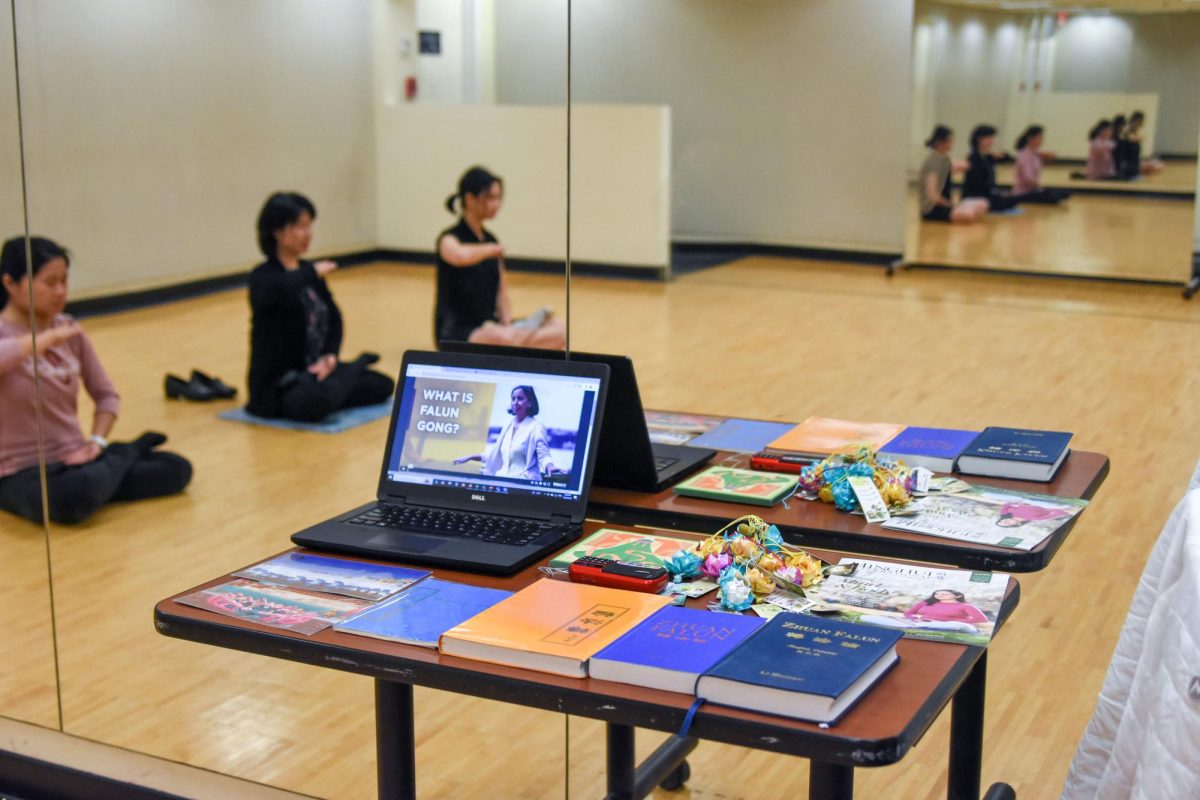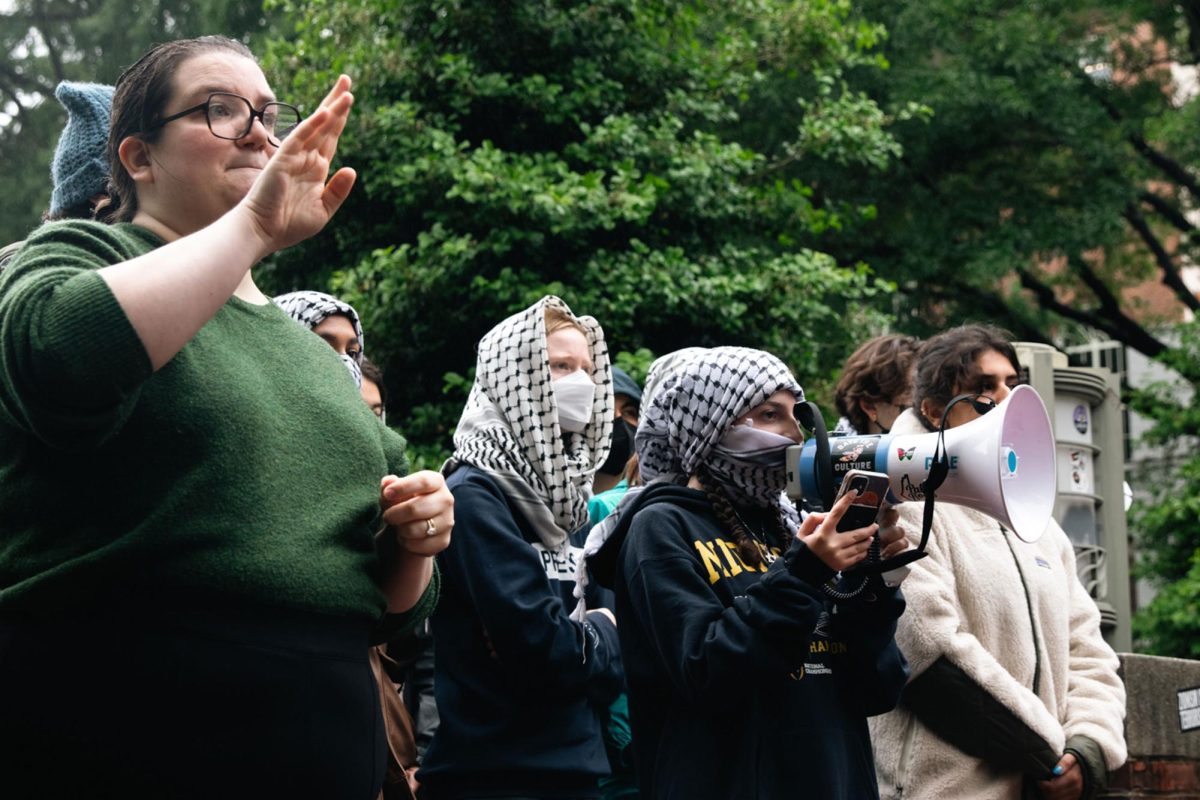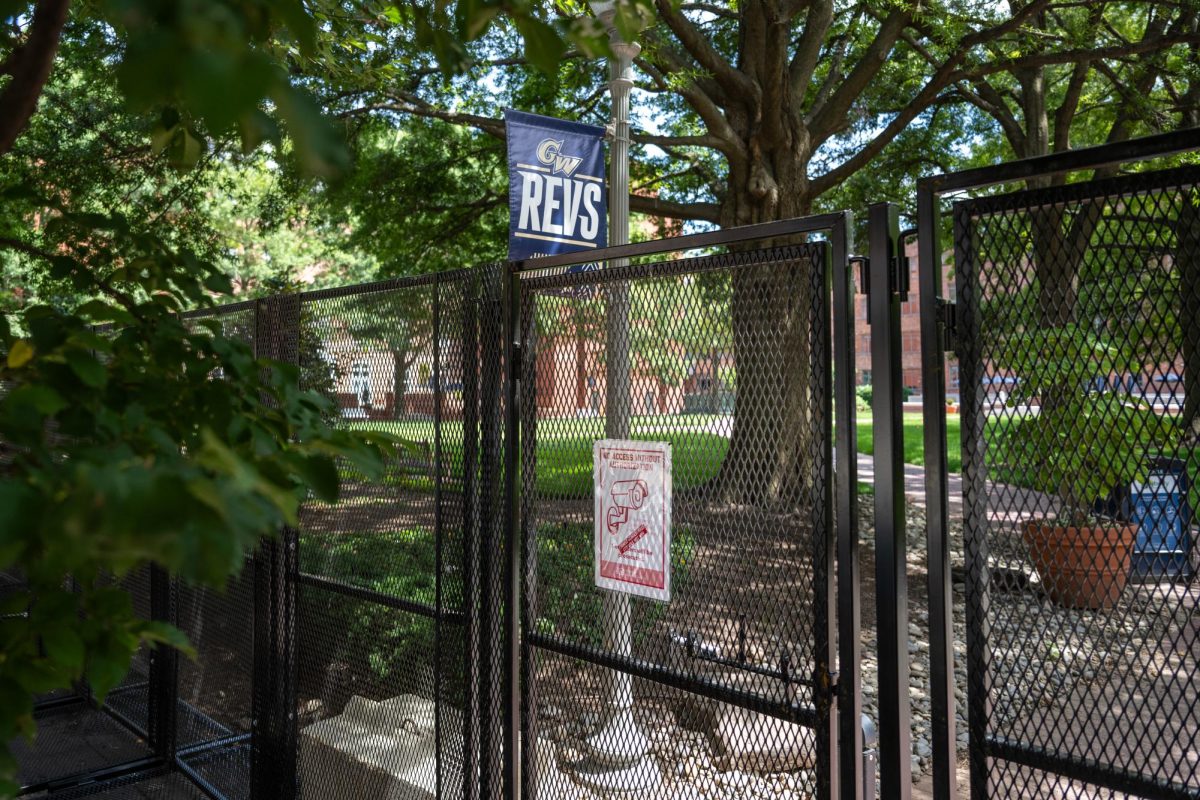The chime of a bell interrupts the stillness of a University Student Center room, signaling the transition to a new meditation pose for a handful of students who gather in the space every week to practice mindfulness through motion in unison.
The students are members of GW Falun Dafa, an organization formed in October that observes a Chinese spiritual movement centered around meditation and mindfulness using controlled body movement. Jade Do, a first-year graduate student and the group’s president, said the organization upholds the three virtues of the practice — truthfulness, compassion and forbearance, and tolerance — by reading Falun Dafa’s guiding book while creating a space for students from East and South Asian cultures to connect with their values and community while living in the United States.
“I want to create a safe space in an environment for people to come learn and practice Falun Dafa,” Do said. “It’s a place where they can come and socialize through the meditation, read the book and then share our experiences and then discuss any issues we are having in our daily lives.”
Falun Dafa, also known as Falun Gong, was founded in China in 1992 by Li Hongzhi, the movement’s spiritual leader. Hongzhi wrote all of the texts observers use for spiritual practice, one of the most prominent being Zhuan Falun, the guiding book observers utilize.
The practice combines spiritual and moral teachings with a series of exercises, which involve concentrated arm movements like placing one’s palms together in front of the chest and extending arms out to the side with palms facing down that observers may hold for 15 to 30 minutes at a time. Some of these series of poses include Falun Standing Stance, Falun Cosmic Orbit and Reinforcing Supernatural Powers.
The exercises are meant to improve one’s mental and physical health, which revolve around meditation and regulated breathing in the Falun Dafa spirituality, according to the book.
Do said GW Falun Dafa has meditation sessions on Mondays and Fridays in the student center, where members participate in movements that can take up to two hours to complete. She said positions like Falun Standing Stance, where one holds their arms above their head, are difficult to hold for a long time, but the transition between movements represents releasing tensions in one’s life.
“If you let go of your attachments and whatever you have in mind, you become lighter and everything becomes easier,” Do said.
Do said she started practicing Falun Dafa her first year at the University of Miami, where she started a student organization for Falun Dafa observers after feeling “lost” growing up. She said the spiritual practice allowed her to better adapt to Western culture after being raised in Vietnam, driving her to bring the same undergraduate environment to GW.
Do said Falun Dafa’s three core virtues taught her to be more attentive and present while connecting with classmates and professors after learning from the teachings that not attending lectures was “disrespectful.” She said Falun Dafa encourages her to think about her actions and how they affect the people around her.
“Even though today, I have all the material things that I needed, I feel like I needed some moral compass to guide me through life,” Do said.
She said the organization used a Free Bubble Tea & Meditation Workshop on Oct. 30 to introduce Falun Dafa to prospective members.
“I hope that if they are looking for something, they can find this book and practice,” Do said. “I hope that they can really find a way to get them to become a better person.”
The Chinese Communist Party banned Falun Dafa as an organized religion on China’s mainland, branding it a “heretical cult” after the group protested the CCP in 1999. Since its defeat, the CCP has arrested, detained and killed observers for their continued practice within China, but the spiritual practice has remained present in Hong Kong and Taiwan.
Falun Dafa has alleged ties to the Epoch Times, a conservative newspaper known for promoting right-wing misinformation, but neither organization has confirmed the relationship. Some Chinese immigrants in the U.S. have also accused the Falun Gong of being a cult because some observers ascribe to Hongzhi’s unconventional teachings like alien visitation and ethnic separation.
Do said Falun Dafa teachings tell followers not to get involved with political movements. She said she does not want GW Falun Dafa to be affiliated with a “specific Chinese political standpoint” and instead prefers the group focus solely on meditation and, later on, incorporate aspects of human rights into the group’s meetings.
Bharat Premnath, a second-year graduate student and the events director of GW Falun Dafa, said in addition to their biweekly meditation sessions, he plans to host workshops to discuss the three principles of the practice and how they can be applied to daily life. He said he also plans to host events that will showcase the cultural aspects of the practice like traditional dance, music and art.
“Falun Dafa places a strong emphasis on meditation as a means to cultivate the mind and body,” Premnath said in an email. “It can be a powerful way for members to experience the principles firsthand.”
Premnath said he grew up in India practicing Hinduism and would see people practicing Falun Dafa exercises in nearby parks, recognizing similar values in the movement to Hinduism like virtue and karma. He said only non-Chinese students can openly practice Falun Dafa due to the persecution in China, so he decided to join the organization to “show support.”
Omkar Balasaheb Mane, a graduate student and member of GW Falun Dafa, said he does not practice Falun Dafa but joined the organization for a sense of community and building relationships. He said Falun Dafa’s virtues have helped him “stay true” to his culture and identity after coming to GW in August from India.
“Studying abroad does not mean that I need to abandon my roots and identity,” Mane said in an email. “I can stay truthful to the Eastern principles of filial piety, integrity, and hardwork and still thrive in the West.”
He said Falun Dafa represents an authentic aspect of Chinese and Asian culture and is a “must-have” on GW’s campus. He said GW Falun Dafa’s events have held a “positive energy,” which he appreciates.
“I think Falun Dafa can make a person become a better version of himself, which benefits that person individually, his family, his friends and ultimately his community,” Mane said.








